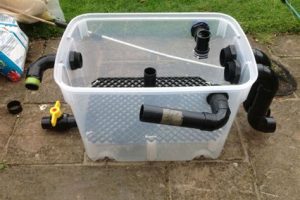Table of Contents
Looking to start your own DIY farm projects? Discover a range of innovative and practical ideas for your farm, including building chicken coops, constructing raised garden beds, creating compost bins, and more. Get inspired and learn how to bring sustainability and self-sufficiency to your own backyard with these DIY farm projects.
Are you looking for a rewarding and practical way to spend your free time? Look no further than DIY farm projects! Whether you have a green thumb or just a love for nature, these projects offer an excellent opportunity to get your hands dirty and create something beautiful. From building raised beds to constructing chicken coops, the possibilities are endless. Plus, by taking on these projects yourself, you can save money and showcase your creativity. So why wait? Let’s dive into the world of DIY farm projects and discover the joy of creating your own outdoor oasis.
Introduction
When it comes to farm projects, there’s always something that needs fixing or improving. Whether you’re a seasoned farmer or just getting started, DIY farm projects can be a great way to save money and get things done on your own terms. From building animal shelters to creating efficient irrigation systems, there are countless projects you can tackle to enhance the functionality and productivity of your farm. In this article, we will explore some exciting DIY farm projects that you can easily undertake.
1. Building a Chicken Coop
Keeping chickens is a popular venture for many farmers, and building a chicken coop is an essential project to ensure their safety and comfort. Constructing a chicken coop can be easily done with basic carpentry skills and the right materials. Make sure to provide adequate ventilation, nesting boxes, and perches for your feathered friends.
2. Constructing Raised Garden Beds
Raised garden beds offer numerous advantages, such as improved soil drainage, better pest control, and easier access for planting and harvesting. By constructing raised garden beds, you can optimize your farm’s vegetable production and create a visually appealing space. Use untreated lumber or recycled materials to build the frames and fill them with quality soil.
3. Installing Drip Irrigation Systems
Efficient irrigation is essential for any farm, and drip irrigation systems offer a highly effective solution. These systems deliver water directly to the base of plants, minimizing wastage and ensuring that each plant receives adequate moisture. Installing a drip irrigation system can save you time and water while promoting healthier crop growth.
4. Creating a Composting System
Composting is an excellent way to manage organic waste on your farm and produce nutrient-rich compost for your plants. Building a composting system can be as simple as constructing a three-bin structure using wooden pallets or repurposed materials. Remember to balance green and brown materials and turn the compost regularly to ensure proper decomposition.
5. Constructing a Greenhouse
A greenhouse allows you to extend your growing season and protect delicate plants from harsh weather conditions. Building a greenhouse can be a more advanced DIY project, but with careful planning and research, it is achievable. Choose a suitable location, consider the materials needed, and design a structure that suits your specific needs.
6. Building a Farm Stand
If you have surplus produce or homemade goods to sell, constructing a farm stand can be a fantastic way to connect with your community and generate additional income. A simple farm stand can be built using basic carpentry skills and materials such as reclaimed wood. Make sure to design it attractively and consider adding signage to attract customers.
7. Installing Solar Panels
Solar energy is an eco-friendly and cost-effective solution for powering your farm. By installing solar panels, you can reduce your reliance on traditional energy sources and cut down on electricity bills. While this project may require professional assistance, it can provide long-term benefits for your farm’s energy needs.
8. Constructing Animal Shelters
Providing suitable shelter for your livestock is crucial to their well-being and protection from the elements. Depending on the type of animals you have, constructing animal shelters can range from simple structures to more elaborate barns. Ensure appropriate ventilation, proper flooring, and adequate space for your animals to move comfortably.
9. Building a Rainwater Harvesting System
Conserving water is essential in farming, especially in regions with limited rainfall. Building a rainwater harvesting system can help you collect and store rainwater for use during dry periods. You can create a system by installing gutters, downspouts, and storage tanks to collect and store rainwater. This sustainable practice can significantly reduce your reliance on external water sources.
10. Creating a Farm Tool Storage Area
Organizing and storing your farm tools properly is essential for efficiency and longevity. Building a dedicated tool storage area can help protect your equipment from the elements and keep everything easily accessible. Consider using pegboards, shelves, and hooks to maximize space and keep your tools in good condition.
Conclusion
Embarking on DIY farm projects not only allows you to save money but also enables you to personalize your farm according to your specific needs. From constructing animal shelters to installing solar panels, the possibilities are endless. Remember to plan carefully, gather the necessary materials, and always prioritize safety. With a little creativity and determination, these projects will enhance the functionality and productivity of your farm while showcasing your DIY skills.
DIY Farm Projects: Enhancing Your Agricultural Space
In today’s world, where sustainability and efficiency are paramount, implementing DIY farm projects can revolutionize your agricultural space. From optimizing irrigation systems to constructing portable chicken coops, these projects offer a range of benefits that contribute to the overall health and productivity of your farm. In this article, we will explore eight DIY farm projects that will enhance your agricultural space and help you create a more sustainable and efficient farming operation.
1. Efficient Irrigation Systems: Discover the World of Drip Irrigation
One of the most effective ways to optimize water usage on your farm is by implementing drip irrigation systems. This DIY project delivers water directly to the roots of your crops, conserving water while improving their overall health and yield. By reducing water wastage through evaporation and runoff, drip irrigation not only saves time and effort but also ensures a productive and sustainable farm.
2. Constructing Portable Chicken Coops: Flexibility and Freedom for Your Flock
If you have a flock of chickens on your farm, building portable chicken coops can provide flexibility and freedom for your feathered friends. These DIY projects allow you to easily move the coops around your land, providing fresh grazing areas for your chickens. Additionally, they protect your flock from predators, ensuring a safe and healthy environment for your poultry.
3. Composting Made Easy: Transforming Waste into Nutrient-Rich Soil
Creating your own composting system is a simple and effective way to transform organic waste into nutrient-rich soil. By incorporating composting into your farm practices, you not only reduce waste but also enhance the fertility and productivity of your land. Utilizing kitchen scraps and yard trimmings, this DIY farm project allows you to create a sustainable cycle of waste management and soil enrichment.
4. Installing Solar-Powered Electric Fencing: Efficient Livestock Containment
When it comes to securing the safety and containment of your livestock, solar-powered electric fencing offers numerous advantages. This DIY project allows for easy installation of fencing that deters unwanted animals while harnessing solar energy for a more sustainable solution. By keeping your livestock secure and reducing your farm’s environmental impact, you can ensure the well-being of your animals and contribute to a greener future.
5. Constructing Raised Garden Beds: Optimize Plant Growth and Minimize Maintenance
Raised garden beds are an excellent DIY farm project that optimizes plant growth while minimizing weed growth and maintenance. These projects offer numerous benefits, including improved soil quality, better drainage, and easier access for planting and harvesting. By building raised garden beds, you can enhance the overall aesthetic and productivity of your farm while reducing the effort required for maintenance.
6. Building a Greenhouse: Extending Growing Seasons and Crop Variety
A greenhouse is a valuable addition to any farm as it allows you to extend growing seasons, protect plants from harsh weather conditions, and expand the range of crops you can cultivate. With a well-designed greenhouse, you can create an optimal environment for your plants to thrive, ultimately increasing your farm’s productivity. Building a greenhouse is a DIY project that offers long-term benefits and opens up new possibilities for crop variety.
7. Developing a Rainwater Harvesting System: Utilizing Nature’s Resource
By creating a rainwater harvesting system, you can harness the power of nature and reduce your reliance on conventional water sources. This DIY farm project enables you to collect and store rainwater, which can then be used for irrigation, watering livestock, or providing drinking water for your animals. By utilizing this natural resource, you can contribute to water conservation efforts and make your farm more sustainable.
8. Creating DIY Farm Tools: Enhance Efficiency on Your Farm
Embrace innovation and craftsmanship by creating personalized DIY farm tools that enhance efficiency and productivity. From hand tools to equipment modifications, these projects allow you to save money and tailor your solutions to your specific needs. By embracing DIY farm tools, you can streamline your agricultural practices and optimize your farming operation.
In conclusion, DIY farm projects offer numerous opportunities to enhance your agricultural space and create a more sustainable and efficient farming operation. From optimizing irrigation systems to constructing portable chicken coops, each project contributes to the overall health and productivity of your farm. By embracing these DIY projects, you can not only improve the quality of your crops and livestock but also reduce waste, conserve resources, and contribute to a greener future for agriculture.
In today’s fast-paced and technology-driven world, the concept of do-it-yourself (DIY) projects has gained immense popularity. From home improvement to crafting, people enjoy taking on tasks themselves rather than relying on professionals. However, when it comes to farm projects, it is crucial to consider the benefits of hiring professionals for such tasks. Here are a few reasons why DIY farm projects may not always be the best option:
-
Expertise and Experience: Professionals have years of training and experience in their respective fields. When it comes to farm projects, they possess the necessary knowledge and skills to handle complex tasks efficiently. Their expertise ensures that the project is completed correctly and meets industry standards.
-
Time and Efficiency: Farm projects often require careful planning and execution. Professionals have the ability to efficiently manage resources, streamline processes, and complete tasks within a specified timeframe. This saves valuable time for farmers, allowing them to focus on other important aspects of their operations.
-
Access to Specialized Equipment: Farm projects often involve the use of specialized equipment and machinery. Professionals have access to a wide range of tools and resources required for different tasks. This ensures that the project is carried out using the most appropriate and efficient equipment, resulting in better outcomes.
-
Reduced Risks and Safety: Farm projects can involve potential risks and hazards. Professionals are trained to identify and mitigate these risks, ensuring the safety of both individuals and livestock. They adhere to safety protocols and regulations, minimizing the chances of accidents or injuries.
-
Long-Term Cost Savings: While hiring professionals may seem more expensive initially, it can lead to long-term cost savings. Professionals ensure that the project is completed correctly the first time, reducing the need for costly repairs or modifications in the future. Their expertise also helps optimize processes, leading to improved efficiency and reduced expenses over time.
In conclusion, while DIY projects can be enjoyable and fulfilling, it is essential to recognize the advantages of hiring professionals for farm projects. Their expertise, experience, access to specialized equipment, and commitment to safety can greatly benefit farmers in achieving desired outcomes efficiently and effectively.
Dear valued blog visitors,
As our time together comes to a close, we want to express our gratitude for your interest in our DIY farm projects. We hope that the information shared throughout this article has been helpful and inspiring. Our aim was to provide you with some practical ideas and guidance on how to embark on your own farm projects, all while maintaining a professional tone.
First and foremost, we believe it is essential to stress the importance of proper planning when undertaking any DIY farm project. Planning allows you to envision the end result, consider potential challenges, and set a realistic timeline. Whether you are building a chicken coop, constructing raised garden beds, or setting up a small-scale irrigation system, investing time in planning will undoubtedly save you from unnecessary headaches down the road.
Furthermore, we encourage you to consider the materials you use for your projects. Sustainable and environmentally friendly options should always be at the forefront of your decision-making process. By utilizing recycled or repurposed materials whenever possible, you not only reduce waste but also contribute to a more eco-conscious farm. Additionally, incorporating natural elements into your projects, such as untreated wood or organic fertilizers, can promote healthier growth and better overall results.
Lastly, but certainly not least, we want to emphasize the significance of safety precautions. While DIY projects can be exciting and fulfilling, they also come with inherent risks. Always wear appropriate protective gear, such as gloves, goggles, and sturdy footwear, to minimize the chances of accidents or injuries. Familiarize yourself with the correct usage of tools and equipment, and never hesitate to seek professional assistance if you are unsure about any aspect of the project. Remember, your safety and well-being should always be the top priority.
In conclusion, we hope that this article has provided you with valuable insights into the world of DIY farm projects. By planning carefully, choosing sustainable materials, and prioritizing safety, you can successfully undertake various endeavors on your farm. We appreciate your readership and wish you the best of luck in all your future farming ventures.
Sincerely,
The DIY Farm Projects Team
.
People also ask about DIY Farm Projects:
-
What are some popular DIY farm projects?
Some popular DIY farm projects include building raised beds for vegetable gardens, constructing chicken coops or barns, creating compost bins, setting up rainwater harvesting systems, and installing solar panels for energy efficiency.
-
How much does it cost to start a DIY farm project?
The cost of starting a DIY farm project can vary depending on the size and complexity of the project. Simple projects like building raised beds or compost bins can be done for under $100, while larger projects like constructing a barn or installing solar panels may require several thousand dollars.
-
Are there any resources available for DIY farm projects?
Yes, there are plenty of resources available for DIY farm projects. You can find step-by-step guides and tutorials online, join farming communities or forums where experienced farmers share their knowledge, or visit local agricultural extension offices that offer workshops and classes on various farm projects.
-
What skills are needed for DIY farm projects?
DIY farm projects may require a variety of skills depending on the specific project. Some common skills include basic carpentry, plumbing, electrical knowledge, and gardening expertise. It’s essential to assess your skillset and seek guidance or learn new skills if necessary before embarking on a DIY farm project.
-
Are DIY farm projects suitable for beginners?
DIY farm projects can be suitable for beginners, especially if they start with smaller and simpler projects. It’s important to start with manageable tasks, gain experience, and gradually take on more complex projects as you become more comfortable and knowledgeable.
-
Can DIY farm projects be environmentally friendly?
Absolutely! DIY farm projects can be designed with sustainability and environmental friendliness in mind. For example, using reclaimed materials for construction, implementing rainwater harvesting systems, practicing organic gardening methods, or incorporating renewable energy sources like solar panels are excellent ways to make DIY farm projects more eco-friendly.






